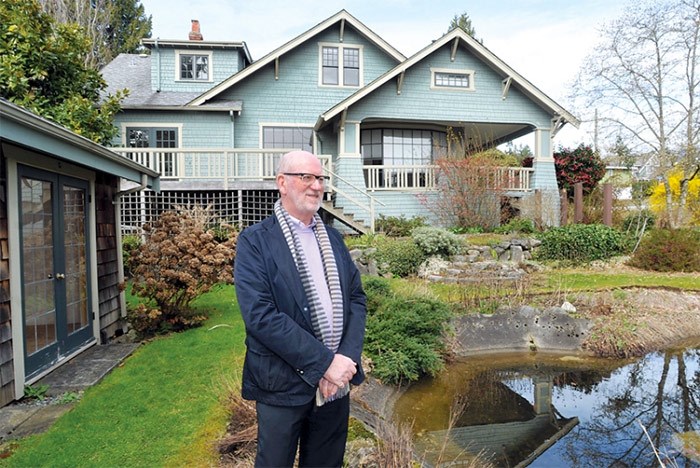 Developer Michael Geller stands outside a heritage home he owns in West Vancouver. Geller worries he could be hit by the speculation tax while he awaits permits. PHOTO PAUL MCGRATH, North Shore News
Developer Michael Geller stands outside a heritage home he owns in West Vancouver. Geller worries he could be hit by the speculation tax while he awaits permits. PHOTO PAUL MCGRATH, North Shore News
Experts are still left to speculate how B.C.’s incoming speculation tax will impact properties on the North Shore.
Starting in 2018, vacant secondary homes in large urban centres will be charged 0.5 per cent on their assessed value. In 2019, foreign owners and satellite families (where the family lives here but working parent and source of income lives elsewhere and does not file taxes here) will pay two per cent annually. Owners whose primary residence is elsewhere in Canada will pay one per cent. British Columbians captured by the tax will be billed 0.5 per cent.
Primary residences of British Columbians are exempt, as are second homes valued at less than $400,000, and properties rented out at least six months a year. The province has also spared vacation properties outside major urban areas like the Gulf Islands and Bowen Island.
Finance Minister Carole James estimates 99 per cent of British Columbians won’t pay the tax at all, but even with exemptions in place, the province expects it will bring in $200 million in revenues per year.
Someone who owns a $5-million home but pays little or no income tax to the province could be paying about $100,000 a year in speculation tax.
“That’s a lot of money,” said Tom Davidoff, a UBC economist whose work the NDP borrowed from in designing the speculation tax.
The goal of the tax, Davidoff said, is to counteract the relatively low property taxes we pay in B.C. compared to income tax.
“I think inviting people to come use Vancouver as a playground for the rich is a mistake and I think it’s a very big, long-run problem,” he said. “The message was ‘Come here to buy real estate. Don’t try to make a living here.’”
Andy Yan, director of Simon Fraser University’s City Program, is waiting eagerly to see how the province will administer the tax, particularly when it comes to identifying satellite families.
Safe to say though, a lot of tax money will be coming from West Vancouver, he added. The 2016 census found almost one in 10 West Van homes was “non-owner occupied.” An analysis of census data by Yan last year found almost a fifth of West Vancouver households are “low income” despite an average price of a detached home at $3 million, and with higher levels of child poverty in the toniest neighbourhoods.
“God knows I’d love access to their data,” Yan said. “When you have these multimillionaires that are just declaring $95 of income, I mean, come on here. What is going on?”
And, according to the last census, West Vancouver is one of only two municipalities in the Lower Mainland with a population in decline. During a recent walk through Dundarave and Ambleside, Yan said he was struck by the number of vacant storefronts.
“How much of it is the fact they’re servicing a population that’s smaller now than when those neighbourhoods were first created? This type of emptiness does have an effect on things like local retail,” he said.
Developer Michael Geller said he’s softened on the notion of a tax after being outright opposed.
“I have a fundamental problem with the government violating that old Magna Carta notion that a man’s home is his castle to do with as he pleases, but I acknowledge we’re past that now,” he said. “We have a housing crisis and I can accept why government may want to tax vacant properties in an effort to either bring them into use as rental housing or to generate revenue to support other affordable housing,” he said.
But, he warned, West Vancouver has very little housing stock that would be deemed “affordable” even if it were to be brought into the rental market.
Yan agreed.
“With some of those mansions, they’re probably so expensive, you’re probably not going to get a renter,” he said. “But on the other side, this is one way of capturing that wealth that’s being poured into places like West Vancouver and then using it to frankly pay for amenities, which might be that affordable housing.”
B.C. Liberal Opposition leader Andrew Wilkinson has warned the tax could put a chill on development of new homes if it is applied to properties with construction pending, something Gellar said he struggles to believe the NDP would do. He has an infill housing and heritage restoration plan for a vacant Ambleside property already approved by the District of West Vancouver but, he said, the planning department has told him it will take 15 weeks before they can even look at his building permit application.
“Rather than just phone the building permit department once a week, we’ll call them every day,” Gellar said with a laugh. “There’s sort of an irony that you’re forced to pay a tax on a home that’s empty because you’re waiting for permits.”


